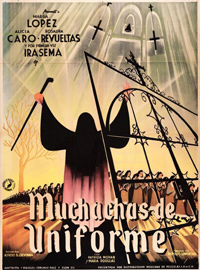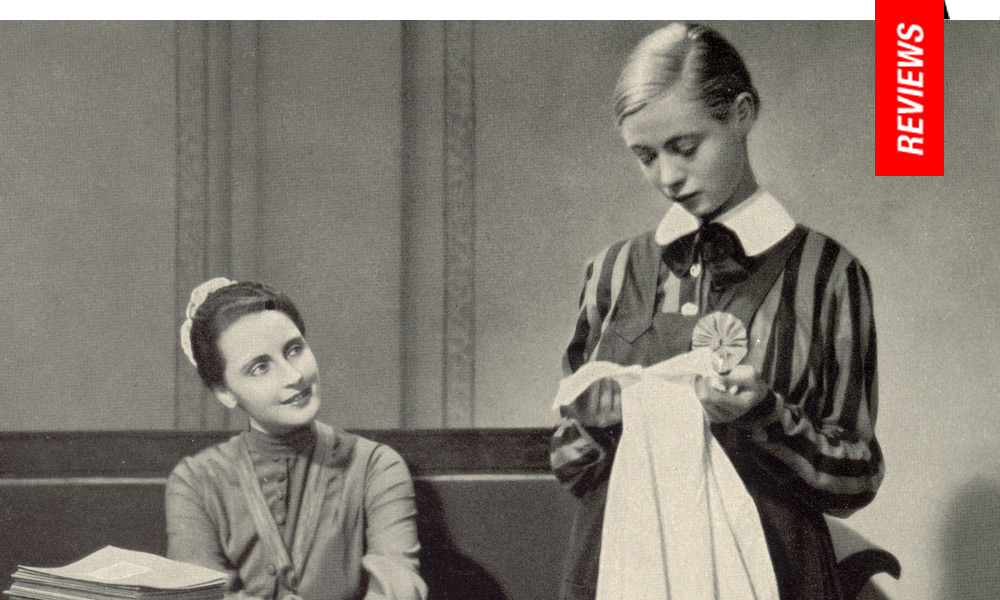Muchachas de Uniforme (1951) | Outfest 2017 LGBT Film Festival Review
Girls Interrupted: Crevenna’s Lost Classic Resurrected in all its Melodramatic Glory
 Although remakes have largely become the bane of the seventh art, how certain properties are interpreted across cultures and periods often begets provocative associations spiking and speckling their concentric source material. Sometimes, these are the films perhaps best appreciated years after they’ve been lost and forgotten, which is exactly the sentiment inspired by Alfredo B. Crevenna’s 1951 adaptation of Muchachas de Uniforme, a Spanish language version of the famous German play by Christa Winsloe, which served as the basis for the 1931 film Madchen in Uniform, widely regarded as the first film centered on lesbian characters (the 1958 German language remake starring Romy Schneider is perhaps equally cited).
Although remakes have largely become the bane of the seventh art, how certain properties are interpreted across cultures and periods often begets provocative associations spiking and speckling their concentric source material. Sometimes, these are the films perhaps best appreciated years after they’ve been lost and forgotten, which is exactly the sentiment inspired by Alfredo B. Crevenna’s 1951 adaptation of Muchachas de Uniforme, a Spanish language version of the famous German play by Christa Winsloe, which served as the basis for the 1931 film Madchen in Uniform, widely regarded as the first film centered on lesbian characters (the 1958 German language remake starring Romy Schneider is perhaps equally cited).
Sweltering with libidinous energy threatening to spew over into hysterical abandon, Crevenna utilizes his all-female cast (using a trick Cukor used in The Women to obscure the peripheral male characters) to proliferate their obfuscated longing with sly innuendo and glances pregnant with barely contained desire. Although unabashedly melodramatic, Crevenna’s version sheds the austerity of its German cousins and throws this homosocial boarding school into something which feels like a Ken Russell inspired version of The Well of Loneliness.
After the death of her mother, Manuela (Irasema Dilian) arrives at an all-girls Catholic boarding school ruled by an iron willed principal (Rosaura Revueltas), who believes in suffering the children. But the school is also currently home to Lucila (Marga Lopez), a non-religious addition to the staff who is at odds with the strict regime. Immediately, Lucila takes pity on the illiterate and unloved Manuela, who responds with unbecoming obsession of her teacher, or, at least according to some of the other girls, including her best gal pal (Alicia Caro), who lands her own heterosexually based trouble. Internal jealousies and power struggles test their newfound friendship as Lucile awaits the day her fiancé will come take her away.
Both cultural context and key players in Muchachas de Uniforme result in some unprecedented extra-textual complexities with Crevenna’s version. With Mexico coming out of 1940s fascism and into rapid industrialization, Crevenna’s film was released a year prior to the succession of President Adolfo Lopez Mateos, who was responsible for granting women the right to vote. While the 1958 version of the material sported the tagline “This Startling Motion Picture Will Be the Yardstick By Which People Will Measure Each Other’s Sophistication,” Crevenna’s treatment has no such qualms about freely mixing the soapy and the sordid.
Of German descent, Crevenna immigrated to Mexico in the 1940s, where he would direct 151 films from 1945 to 1995. In his fifty years of filmmaking, Crevenna dabbled in a number of genre formats, though he was responsible for a series of films headlined by Santo, the famed Mexican luchador. Crevenna was perhaps in peak form throughout the 1950s, however, with a number of melodramas which played like more robust versions of American ‘women’s pictures’ mixed with questionable exploitation elements (for a prime example of this, check out his 1957 Yambao, a chewy horror drama set on a Cuban slave plantation with a performance from Ninon Sevilla which challenges the impassioned tornado known as Tura Satana—and should perhaps be viewed with the corresponding Rifftrax treatment courtesy of the old MST3K crew).
From its impressive cast, which includes many notable figures of 1950s Mexican cinema, Muchachas features an impressive ensemble, but includes three standouts. Rosaura Revueltas is a considerable presence as the imperiously smug principal, a woman who was bred into the position and marked by a pronounced limp. Revueltas, who had previously appeared in the Paulette Goddard vehicle The Torch (1950), would be branded a Communist following her appearance in 1954’s Salt of the Earth (her sole US feature) and deported to Mexico.
Of greater interest, however, are the two women playing the sexually repressed characters at the center of Muchachas, who were actually both the same age and both worked with Luis Bunuel during his Mexican period. Irasema Dilian (who played the Catherine role in Bunuel’s Wuthering Heights), at times recalls a young Carroll Baker and manages to navigate the difficulty of presenting a schoolgirl crush blossoming unawares into sexual awakening. Early outbursts wherein she breaks down in torrential tears screaming “no one has ever loved me” may cause titters by today’s standards of emotional expression, but still appears authentic, nonetheless. As the indefatigably understanding and staunchly atheistic teacher Lucila, Marga Lopez (who was married to famed actor Arturo de Cordova until his death and headlined Bunuel’s Nazarin) exudes patience and control, perhaps as tightly wound as her ornate hairdo.
DP Ignacio Torres spends an awful lot of time attenuating to the pronounced facial expressions of the women in Muchachas de Uniforme, for they hold the key to the film’s intentions, which are more expressively implied and confirmed than any of the 1950s versions of Tennessee Williams in the US. More startling is the expressive set and production design, which transforms an innocuous Catholic school into an off-white hotbed of arches, crevices, and secret spaces looming over the screen like facades ripped from German Expressionism.
Escaping the fate of regurgitated camp, which is a sensibility many obscure cinematic offerings even daring to hint at homosexuality were only able to succeed at (intentionally and otherwise), Muchachas de Uniforme is an exquisite artifact from a neglected period of both Mexican cinema and coded queer representation. Crevenna strikes a balance of self-awareness and sacrilege by focusing on the humanity of his characters despite the harness of their conditioned social proclamations. But, at the end of the day, oh the drama!
Reviewed on July 8th at the 2017 Outfest Film Festival. 83 Mins. Screened in 35mm.
Eric Lavallée is the founder, CEO, editor-in-chief, film journalist and critic at IONCINEMA.com (founded in 2000). Eric is a regular at Sundance, Cannes and TIFF. He has a BFA in Film Studies at the Mel Hoppenheim School of Cinema. In 2013 he served as a Narrative Competition Jury Member at the SXSW Film Festival. He was an associate producer on Mark Jackson's This Teacher (2018 LA Film Festival, 2018 BFI London). In 2022 he served as a New Flesh Comp for Best First Feature at the 2022 Fantasia Intl. Film Festival. Current top films for 2022 include Tár (Todd Field), All That Breathes (Shaunak Sen), Aftersun (Charlotte Wells).
























